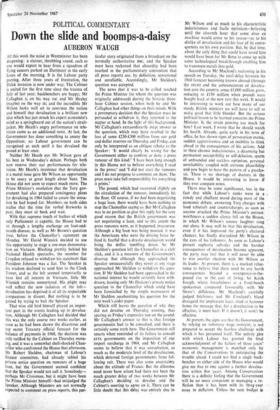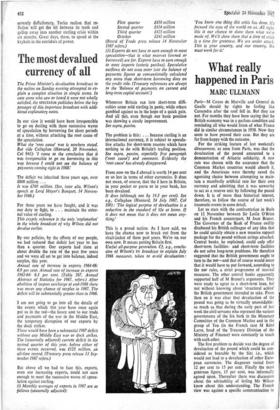Down the slide and boomps-a-daisy
POLITICAL COMMENTARY. '
AUBERON WAUGH
All this week the noise in Westminster has been deepening: a sinister, throbbing sound, such is one would expect to hear from a squadron of flying saucers parked on Dartmoor in the early hours of the morning. It is the Labour party purring. After three years of frustration, the Dalek invasion is now under way. The Cabinet is united for the first time since the trauma of July of last year; backbenchers are happy; Mr Callaghan is on his way out and Mr Healey (maybe) on the way in; and the incredible Mr Wilson looks well set to convince the nation and himself that devaluation is a brilliant new idea which has just struck his expert economist's mind as a springboard out of the nation's strait- jacket. Mr Heath's angry performance on tele- vision came as an additional tonic. At last, the Government has done something to annoy the Opposition; no Labour government can be recognised as such until it has devalued the pound at least once.
Neither Mr Heath nor Mr Wilson gave of his best in Wednesday's debate. Perhaps both now reserve their star performances for tele- vision. Mr Heath's insistence that devaluation is a moral issue gave Mr Wilson an opportunity. to be saucy at great length about Suez. The House did not seem to expect much more. The Prime Minister's revelation that the Tory gov- ernment had also prepared contingency plans for devaluing in 1964 failed to create the sensa- tion he had hoped for. Members on both sides. realise that the time for verbal fireworks is past; they must sit back and wait.
With that supreme touch of bathos of which only Parliament is capable, the House had to sit through a lengthy exchange on foot-and- mouth disease, as well as Mr Brown's question time, before the Chancellor's statement on Monday. Mr David Winnick decided to use this opportunity to stage a one-man demonstra- tion on Vietnam. Blushing prettily behind his National Health spectacles, the member for Croydon refused to withdraw his statement that President Johnson was a liar. The Speakerin his wisdom declined to send him to the Clock Tower, and as the left seemed temporarily to have lost all interest in Vietnam, little Mr Winnick remains unmartyred. His plight may well reflect the new isolation of the left— devaluation has deprived it of all its respectable companions in dissent. But nothing is to be gained by trying to bait the Speaker.
That wise old bird himself played an impor- tant part in the events leading up to .devalua- tion. Although Mr Callaghan had decided that this was the only course two weeks earlier, as soon as he had been shown the disastrous and top secret Treasury official forecast for the balance of payments in 1968, the decision was only ratified by the Cabinet on Thursday morn- ing, and it was a somewhat shell-shocked Chan- cellor who confronted the House that afternoon. Mr Robert Sheldon, chairman of Labour's finance committee, had already tabled his private notice question on •rumours of a huge loan, but the Government seemed confident that the Speaker would not call it. Somebody— perhaps Mr Crossman, but it might have been the Prime Minister himself—had misjudged the Speaker. Although Ministers are not normally expected to comment on press reports, this par-
ticular story originated from a broadcast on the normally authoritative Bac, and the Speaker must have reckoned that absurdity had been reached in the parliamentary convention that all press reports are, by definition, sensational and unreliable. Accordingly, Mr Sheldon's question was accepted.
The news that it was to be called reached the Prime Minister (to whom the question was originally addressed) during the historic three- hour Cabinet session, when both he and Mr Callaghan had other things on their minds. With a peremptory decision that the Speaker must be persuaded to withdraw it, they returned to the matter at hand. In the light of this background, Mr Callaghan's extraordinarily inept answer to the question, which may have resulted in the loss of some £250-£300 million from our gold and dollar reserves on Thursday and Friday, can only be interpreted as an oblique rebuke to the Speaker: 'It would dearly be wrong for the Government either to confirm or deny a press rumour of this kind;' I have been long enough in this House not to believe everything I read in the press;' and 'I did not start the rumours and I do not propose to comment on them. The press must take full responsibility for everything it prints.'
The pound, which had recovered slightly on the circulation of the rumour, immediately hit the floor. Of course, if we had been negotiating a huge loan, there would have been nothing to stop the Chancellor saying so. But Mr Callaghan was in no position to give this reply for the very good reason that the British government was not negotiating a loan, and to this extent the press rumours were, as it happened, inaccurate. Although a big loan was being mooted, it was the Americans who were the driving force be- hind it, fearful that a drastic devaluation would bring the dollar tumbling down. So Mr Sheldon's question left the Chancellor in a cleft stick, and it is a measure of the Government's disarray that although they approached the Speaker unsuccessfully they never at any stage approached Mr Sheldon to withdraw his ques- tion. If Mr Sheldon had been approached in the national interest he would certainly have with- drawn, leaving only Mr Dickens's private notice question to the Chancellor which could have been forestalled by the simple manoeuvre of Mr Sheldon resubmitting his question for the next week's order paper.
Which still leaves the question of why they did not devalue on Thursday evening, thus sparing us Friday's expensive run on the pound. Mr Callaghan's answer to this is that foreign governments had to be consulted, and there is certainly some truth here. The Government still smarts when reminded of its failure to consult EFTA governments on the imposition of our import surcharge in 1964, and Mr Callaghan seems to believe that it was consultation, as much as the moderate level of the devaluation, which deterred foreign governments from fol- lowing suit. There was also some uncertainty about the attitude of France. But the dilemma need never have arisen had there not been the much greater delay of two weeks between Mr Callaghan's deciding to devalue and the Cabinet's meeting to agree on it. There can be little doubt that this delay was entirely due to
Mr Wilson and as much to his characteristic indecisiveness and facile optimism—believing
until the eleventh hour that • some deus ex machina would come to his rescue—as to his
dislike of devaluation and his fear of its conse- quences on his own position. But, by that time, about the only thing that could have saved him would have been for Mr Benn to come up with some technological breakthrough enabling him to transmute metals into gold.
According to Mr Macleod's reckoning in his speech on Tuesday, the total delay between the 1968 forecast becoming known abroad (through the oEcn) and the announcement of devalua- tion cost the country some £1,000 million gross, reducing to £150 million when pounds Were bought back at the new rate this week. It would be interesting to work out how many of our sturdy British minicars we will have to sell to make good that little blunder. But the serious political lesson to be learned concerns the Prime Minister. Is the strain proving too much for him? Last week, I wrote that he should watch his health. Already, quite early in his term of office, he has shown signs of persecution mania, sudden aggressiveness and an inability to think ahead to the consequences of his actions. Add to these chronic indecisiveness, a disarming but permanent susceptibility to self-delusion, spurts of unfounded and reckless optimism, personal unreliability coupled with extreme plausibility and.you begin to have the pattern of a psycho- sis. There is no shortage of doctors in the House. It would be interesting to know it they ever compare notes.
There may be some significance, too, in the . fact that while Labour's ranks were in a t rowdy and ebullient mood during most of the economic debate, answering Tory charges with loud rebuttals and countercharges, as soon as anyone attacked .the Prime Minister's untrust-
worthiness a sudden silence fell on the House, in which Mr Wilson's uneasy laughter rang out alone. It may well be that this devaluation, even if it has improved the party's electoral chances, has finally discredited Mr Wilson in the eyes of his followers. As soon as Labour's present euphoria subsides and the harsher consequences of devaluation become apparent, the party may feel that it will never be able to win another election with Mr Wilson as its leader. At present, there is a marked reluc- tance to believe that there need be any harsh consequences beyond a sevenpence-in-the- pound rise in the cost of living. Sir Keith Joseph, whose forcefulness as a front-bench
spokesman compared favourably with Mr Shore's diffidence, Mr Macleod's carefully judged bitchiness and Mr Crosland's bland disregard for unpleasant facts, tried to hammer home the message that, for a devaluation to be effective, it must hurt. If it doesn't, it won't be effective.
At present. the signs are that the Government, by relying on voluntary wage restraint, is not prepared to accept the fearless challenge with which it has presented itself. The unholy glee with which Labour has greeted the final acknowledgment of the failure of three years' economic management is matched only by that of the Conservatives In anticipating the
trouble ahead. I could not find a single back- bencher on either side of the House who would give me five to one against a further devalua- tion within five years. Among Conservatives there is a definite feeling that the Government will be no more competent at managing a re- flation than it has been with its three-year essay in deflation. Unless the next budget is severely deflationary, Tories reckon that re, nation will get the bit between its teeth and gallop away into another sterling crisis within six months. Great days, these, to spend at the keyhole in the corridors of power.















































 Previous page
Previous page